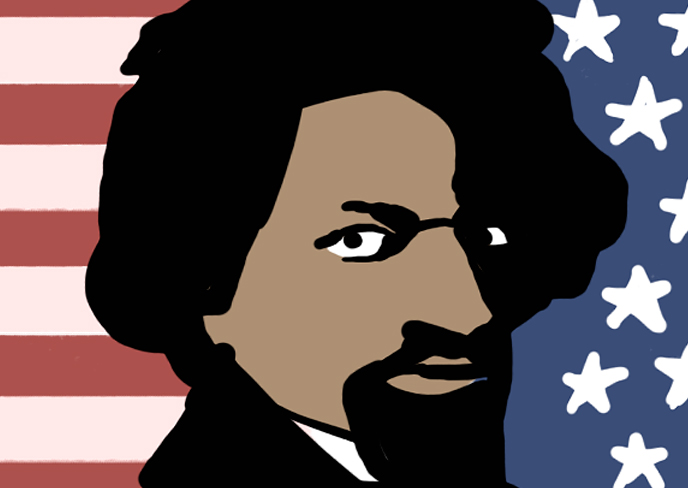Frederick Douglass (born Frederick Augustus Washington Bailey) went down in history as one of the most famous and influential African American leaders of the 19th century. He was an abolitionist, a revolutionary democrat, one of the main figures of African-American liberation movement.
F. Duglas, according to Wikipedia, born a slave in Maryland in 1818. From an early age, the boy lived and worked in the family of planters, one of which might have been his father. Moreover, later he was transferred to the family of Hugh Auld, who, ignoring the ban on teaching slaves to read and write, had acquainted the boy with alphabet. Other useful skills Douglas acquired, watching the owners children. He shared his knowledge with the other slaves, conducting lessons in reading. However, not all slave owners welcomed this initiative: very often the meetings were dispersed with batons and stones. Once Douglas was sent to work for Edward Cowie, from which the young man did not get anything but permanent psychological and physical humiliation (Cowie allowed himself to beat his slaves severely).

The effort of Douglas to escape was successful only from the third time. In 1838 he managed to escape to the North. Douglas helped the woman from Baltimore, who later became his wife. Upon arrival in Massachusetts, he became an ordinary worker. And in 1841, Douglas attended the meeting of Anti-Slavery Society of the state where attracted the attention of the members of the convention, and soon became the leader of all Anti-Slavery movement in New England.
In 1845 he published his autobiography, entitled "Story of the Life of Frederick Douglas: an American slave," according to the horrors of slavery. The book has become very popular in the United States and has been translated into several European languages. Later, it was twice rewritten by the author, as some refinements and important details have been added. The followed the publications of "My Life in Slavery and Freedom" (1855) and "The Life and Times of Frederick Douglass" (1881/2).
However, after the publication, the fact that Douglas is a runaway slave has become well-known. Fearing the prospect of being once again converted to a slave, Douglas decided to leave the country and to go to Ireland, where he planned to give lectures on the topic of the fight against slavery in America. After a couple of years, thanks to the help of British Quakers, Douglas managed to collect enough money to buy their freedom and return to America in the status of a free man.
By the beginning of the Civil War, Frederick Douglass was one of the most famous African-Americans in the country, a brilliant publicist and persuasive speaker. In 1862, Douglas entered into negotiations with President Abraham Lincoln on the treatment of dark-skinned soldiers, and after the war - with President Andrew Johnson on the subject of the electoral rights of African Americans.
Emancipation Proclamation of President Lincoln was proclaimed on January 1, 1863, but on the presidential elections in 1864 Douglas supported John C. Fremont, explaining his decision by saying that President Lincoln did not bother to give freed slaves the right to vote. Proclamation declared free slaves in the Confederate States of America, ie, in the southern areas, and the ensuing 13th Amendment to the Constitution prohibited slavery throughout the United States. Douglas became the first African American, who had been nominated as a candidate for the post of the United States Vice-President in 1872. However, this was done without the consent of the candidate, so he did not participate in the campaign. However, the nomination of Douglas was the first case in US history, when an African American name appeared on the ballot paper.
F. Douglas died on February 20, 1895 from a heart attack. His grave is in the cemetery of Mount Hope in Rochester, New York. Frederick Douglass was a truly remarkable man of his era. Born a slave, he was doomed to experience the hardships of life and the suffering of many, but he found the strength and courage to fight for their rights and for improving the lives of others. Douglas antislavery activities coincided with the period in United States history, when the issue was at the peak of urgency, the President himself understood the need for the abolition of slavery in the country. However, we shouldn’t underestimate the very productive activities of individuals, such as F. Douglas, advocating ideas and initiatives, based on their own (often bitter) experiences. His personality remains in the history as he was really brave and courageous man.